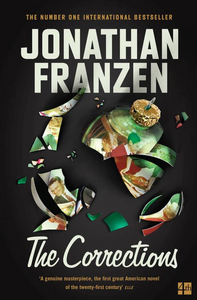You need to sign in or sign up before continuing.
Take a photo of a barcode or cover
Not too bad. Story about a dysfunctional family that was sometimes funny, sometimes sad. I'll probably go on to Read "Freedom" by Franzen, too.
Let this one settle in for a night before writing a review. Freedom was my very first Franzen novel, earlier this summer where I devoured the first half and then felt like I was slogging through the rest. I had the reverse experience with The Corrections. The first half felt dizzyingly dense and strenuous and then suddenly the impossible tapestry that Franzen weaves at the beginning begins to unspool into some of the most engaging, rich, and heartbreaking narrative I’ve ever read.
The Corrections truly solidified for me around the original Lambert family dinner, the one with Denise in utero. The dynamics that stretch from the beginning and all the way to the end play out in one mundane middle American family dinner.
So what are the “corrections?” There’s Chip’s corrections for his truly god-awful sounding play, there’s Enid’s correction of her husband and children’s seeming misalignment with her ideal vision for a family, there’s Denise’s correction for the neglect she faced as the youngest, Gary’s correction of his own familial reenactment of his functionally dysfunctional childhood. And then there the correction of Alfred, the sun-downing and miserably misunderstood patriarch of the Lambert family. Alfred’s correction is a cover up of transgression that crossed his family life and his work. But there’s also the way that everyone seeks to correct Alfred’s Parkinson’s diagnosis and dementia. He ends up in what feels like an actual correctional facility (the coy euphemism the US uses to describe prisons), under custodial care that is worse than death.
In this way, correction also connects to incarceration, to the various levels that the penitential and punitive play out in our lives. Without explicitly stating it, I think Franzen is questioning the forms of imprisonment (again on more registers than I could account for in this review) we’ve created for other people and the ones we impose on ourselves. It’s then almost too fitting that Franzen next novel would explore the conceptual antithesis to imprisonment: Freedom.
The Corrections truly solidified for me around the original Lambert family dinner, the one with Denise in utero. The dynamics that stretch from the beginning and all the way to the end play out in one mundane middle American family dinner.
So what are the “corrections?” There’s Chip’s corrections for his truly god-awful sounding play, there’s Enid’s correction of her husband and children’s seeming misalignment with her ideal vision for a family, there’s Denise’s correction for the neglect she faced as the youngest, Gary’s correction of his own familial reenactment of his functionally dysfunctional childhood. And then there the correction of Alfred, the sun-downing and miserably misunderstood patriarch of the Lambert family. Alfred’s correction is a cover up of transgression that crossed his family life and his work. But there’s also the way that everyone seeks to correct Alfred’s Parkinson’s diagnosis and dementia. He ends up in what feels like an actual correctional facility (the coy euphemism the US uses to describe prisons), under custodial care that is worse than death.
In this way, correction also connects to incarceration, to the various levels that the penitential and punitive play out in our lives. Without explicitly stating it, I think Franzen is questioning the forms of imprisonment (again on more registers than I could account for in this review) we’ve created for other people and the ones we impose on ourselves. It’s then almost too fitting that Franzen next novel would explore the conceptual antithesis to imprisonment: Freedom.
For some reason Franzen really pulls me in with these dysfunctional characters and families... I can't recall reading other books where I really don't like most of the characters, yet somehow I want to know what happens to them. A little longer than it needed to be, and a couple really annoying parts involving excrement. Definitely not as good as Freedom, but an enjoyable read.
I found it interesting that each of the adult children's backstories centers on a sexual relationship. For the eldest, Gary, it's his marriage to a woman who completely controls him because he can't stand it when she's not on his side. She can make him do anything just by means of overt, relentless disapproval. For the middle child, Chip -- his father's favorite -- his sexual misconduct with an undergraduate student sank his academic career. For Denise, the youngest and only daughter, her obsessive behavior in a not-really-love triangle nearly wrecked her professional life.
Each of those struggling adults emerged from the strained midwestern marriage of Enid and Alfred, now in their late 60s, who are having their own very serious difficulties. All the members of this family labor under grudges and unkind judgments about all the others. It makes a fascinating story, which actually has a lot of amusing parts in spite of all the angst -- and these successfully keep it from being a tale of abject misery.
A few of the clearly-meant-to-be-amusing interludes dragged for me, or just went on too long, so that I was speed-reading a bit here and there. I found the story to be very painful toward the end because the author doesn't hold back, and there is real, deep misery at the core of this. I felt a lot of sympathy -- and empathy -- for all of them by the end. Like all unhappy people, they could have made different choices, but they didn't know that.
At the end, there's some hope, some glimmer of a more positive future, for all but one of them. Yet this is not a story of transformation. I feel sad for them all still.
Each of those struggling adults emerged from the strained midwestern marriage of Enid and Alfred, now in their late 60s, who are having their own very serious difficulties. All the members of this family labor under grudges and unkind judgments about all the others. It makes a fascinating story, which actually has a lot of amusing parts in spite of all the angst -- and these successfully keep it from being a tale of abject misery.
A few of the clearly-meant-to-be-amusing interludes dragged for me, or just went on too long, so that I was speed-reading a bit here and there. I found the story to be very painful toward the end because the author doesn't hold back, and there is real, deep misery at the core of this. I felt a lot of sympathy -- and empathy -- for all of them by the end. Like all unhappy people, they could have made different choices, but they didn't know that.
At the end, there's some hope, some glimmer of a more positive future, for all but one of them. Yet this is not a story of transformation. I feel sad for them all still.
What did I think? I think reading The Corrections is one of the hardest things I've had to do in the last couple of months. It took me ages to get half through this book and I just quit at page 400 or so cause there wasn't any sentence that made sense to me. I've tried a couple of times but I don't seem to understand how the characters can be that flat when you're filling 600 pages with them and their life.
I liked the part about Chip and Gary but that was it. Other stuff I just skipped because it was a random flood of words.
I seriously wanted to finish this book but I gave it up. I failed.
I liked the part about Chip and Gary but that was it. Other stuff I just skipped because it was a random flood of words.
I seriously wanted to finish this book but I gave it up. I failed.
This is my second time reading this novel and I have to say that my appreciation for Franzen's writing style has only increased. He can really put a sentence together and make even mundane descriptions entertaining. As a Midwesterner myself, I found the characters to be spot on and painfully human. This is a hard read and not really a pleasurable one but it captures generational conflict better than any novel I've read so far. I think the payoff is worth the struggle.
Interesting well drawn characters but just not interesting enough for me to want to spend any more time with them or to care how they managed to resolve their largely self-inflicted wounds. There is no plot other than them being mean to each other and to themselves
medium-paced
Plot or Character Driven:
Character
Strong character development:
No
Loveable characters:
No
Diverse cast of characters:
No
Flaws of characters a main focus:
Yes




